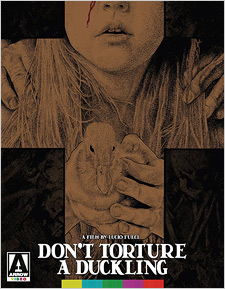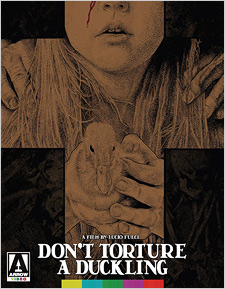Don’t Torture a Duckling: Special Edition (Blu-ray Review)

Director
Lucio FulciRelease Date(s)
1972 (October 3, 2017)Studio(s)
Medusa Distribuzione (Arrow Video)- Film/Program Grade: A-
- Video Grade: A-
- Audio Grade: B
- Extras Grade: B+
Review
Lucio Fulci’s Don’t Torture a Duckling (a.k.a. Non si sevizia un paperino) was released in Italy in 1972, but remained unreleased in the United States until the late 1990s when it first came to home video. It was received fairly well and has since been heralded by many as Fulci’s best work. Telling a story about a small Italian village wherein children are being murdered with everyone eager to expose the culprit behind it afforded Fulci the opportunity to explore more than just visceral horror, delving into something more realistic and honest than some of his later work.
Thought-provoking is how one might describe Don’t Torture a Duckling to someone who’s never seen it. Not a traditional giallo in the sense that it’s not a story about a knife-wielding maniac in black leather gloves making obscene phone calls while being investigated by detectives, authors, and/or photographers; it’s more about the loss of innocence in children and the effect that it has on the living after their sudden and shocking death, or in this case, deaths. For instance, our introduction to Barbara Bouchet’s character is perhaps one of the most beautiful nude visages ever committed to celluloid, but it’s done in such a way that’s not just titillating, but slightly disturbing. She teases a young adolescent boy and we see all of it through his eyes while the music beautifully telegraphs the notion that he’s both excited and frightened by her. There’s also the ending and who the killer is revealed to be. Without spoiling it, the film manages to avoid any tropes that the genre would later become known for. Simply put, Don’t Torture a Duckling is a satisfying piece of cinema, maintaining its staying power as a well-paced piece of dramatic horror.
Understanding what went into creating Arrow Video’s Blu-ray presentation of the film can’t simply be explained in a few quick sentences. As detailed in this release’s accompanying insert booklet, the film was shot using a cost-saving 2-perforation process called Techniscope, which eventually had to be blown up to fit onto a normal 4-perforation 35mm negative for theatrical distribution. As per usual, when a lesser film format is transferred to a larger one, grain levels are much coarser and image detail is much softer. Restoring this material was also problematical due to the extra frames in between shots, which were incorrectly left in for earlier Japanese and German Blu-ray releases. This also caused sync issues with the dialogue, which was unfortunately not repaired properly. Thankfully, at the insistence of both Vincent Pereira and Don May, Jr., this issue has been addressed and corrected for Arrow Video’s U.S. and U.K. Blu-ray debut of the film.
While Don’t Torture a Duckling initially went through an enormous amount of restoration work to repair and adjust a multitude of damage, color correction, and image stabilization issues, Arrow Video has also done a slight bit of additional clean-up, including adjusting the brightness and color timing ever so slightly, as well as performing additional work to repair the opening and closing titles. In essence, it’s the same restoration, but now even more accurate to how it was originally presented. It’s also heads and tails beyond anything previously released on home video. As expected, it has uneven moments when it comes to grain and density, but not to an enormous degree. It’s extremely filmic with excellent texturing, a bold color palette, natural skin tones, good black levels, and satisfactory brightness and overall contrast. Some mild damage that couldn’t be fixed is leftover, including a few scratches and occasional speckling, but there’s no evidence of unnecessary digital tampering to be found. For the audio, both the original English and Italian mono are available via linear PCM tracks. As previously mentioned, sync on both tracks is greatly improved without being perfect. Dialogue is perfectly clear while sound effects and score have some surprising depth. Neither track really boasts amazing clarity as some light distortion and hiss is still present, but both are perfectly listenable and aesthetically pleasing for the presentation at hand. Subtitles are also available in English if needed.
For the supplemental material, there’s an audio commentary on the film with author Troy Howarth; Giallo a la Campagna, a video discussion with author Mikel J. Koven; Hell is Already in Us, a video essay on the perceived misogyny of Lucio Fulci’s work by critic Kat Ellinger; Lucio Fulci Remembers, audio recordings with the director from 1988 in 2 parts; Cast and Crew Interviews (Florinda Bolkan, Sergio D’Offizi, Bruno Micheli, Maurizio Trani); a DVD copy of the film; and a 36-page insert booklet with an essay on the film by Barry Forshaw, an essay on the film’s composer by Howard Hughes, and extensive restoration details by technical director Torsten Kaiser. The aforementioned Japanese Blu-ray release also featured additional extras not carried over here, including The DP’s Eye, an interview with cinematographer Sergio D’Offizi; the alternate Italian opening and closing credits (both of which are now reinstated leaving the English credits absent); the original Italian trailer; and an image gallery. The Blue Underground DVD release also came with a bio on Lucio Fulci.
Don’t Torture a Duckling is a fascinating film, one that was sadly missed out on here in the U.S. theatrically. This isn’t an attempt to put any of Fulci’s other films down at all, mainly a simply comparison, but one can’t deny that this film is truly something special in his long catalogue of work. Although it’s been available on DVD for many years, Arrow Video’s Blu-ray release, as far as I’m concerned, is the definitive presentation of the film. Highly recommended for both Fulci fans and film fans alike.
- Tim Salmons

